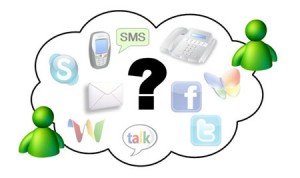When is too much….too much? In this day and age, technology has basically overruled our lives. Sometimes it feels like a full time job when responding back to everyday messages on multiple devices. When was the last time you had a quiet dinner with your family without cell phones ringing or the television blaring in the background? How many devices do you have to check Facebook or Twitter on? If I had to guess, then it would be about three to four devices. So, how does this relate to communication overload?
Imagine reading a email sent from your boss with information stating what he wants in a new memo for you to write about for the next big project coming up. Along with that, he wants you to research the company’s Facebook and Twitter accounts for information to be updated as well. On top of that, you get an email CC’d with your name on it from your coworkers about the upcoming project that the boss wants and what information they should be researching. Feel overwhelmed yet? Also lets consider, that this is ongoing all day with emails going back to back plus phone calls and texts. Take a big breath!!! Theres a solution.
Responsibility. I bet you going huh?? How does that relate to the problem? Lets define it deeper….
“Look at the word responsibility – “response–ability” – the ability to choose your response” (Glei 2014).
Get the picture now? It is your ability to choose your response when it comes down to emails, texts, and/or calls. It is your responsibility to how much you retain, but it also depends on the content creator. Going back to the above example….”Does the email contain information important to you?” Lets say you got a email that is five paragraphs long from a coworker. Are you really going to read all that? Probably not when you have other projects going on. You pick and choose what is important throughout the email and write back on what you retained.
In the article “Stop the Insanity: How to Crush Communication Overload”, Glei writes four steps that can crush communication. Its a matter of information retained from a single source. I find it fascinating on how communication and technology affects us. globally. Almost everyone communicates on two or more devices. I am guilty of that. I use my iPhone and iPad to communicate through texts that are sent to either one. I also get my news from Facebook than a regular newspaper. It has really grown on this generation, and we have really forgotten on how to communicate with one another face to face. Think of communication as a full time job….but without pay, your basically doing it for free.
Sources Cited
Image used: https://www.google.com/search?q=communication+overload&rlz=1C5CHFA_enUS503US503&espv=2&biw=1422&bih=683&source=lnms&tbm=isch&sa=X&ei=gw1RVIPvJ4GfgwT_iIPYAw&ved=0CAYQ_AUoAQ&dpr=0.9#facrc=_&imgdii=_&imgrc=GikErQ1rkciDJM%253A%3BiN7FHuPuS9_k8M%3Bhttp%253A%252F%252Fobelisk.si%252Fwp-content%252Fuploads%252F2010%252F07%252Foverload_s.jpg%3Bhttp%253A%252F%252Fobelisk.si%252Fblog%252Farchives%252F137%3B450%3B267
Glei, Jocelyn K. “Stop the Insanity: How to Crush Communication Overload.” 29 Oct 2014. Web <http://99u.com/articles/7002/stop-the-insanity-how-to-crush-communication-overload>

Your post has made me think about my habits differently. I’ve never considered the amount of time I spend communicating digitally. Now that I think about it, I’m probably spending 40 hours a week sending emails, checking Facebook, and texting. As you have mentioned, it’s pretty much a full time job.
“The Mobile Technology Factsheet” demonstrates that “67% of cell owners find themselves checking their phone for messages, alerts, or calls — even when they don’t notice their phone ringing or vibrating.” Shockingly, 29% of cell owners describe their cell phone as “something they can’t imagine living without.” This is absolutely insane! We have become too dependent on technology for communication and we are beginning to experience communication overload.
Realistically, we cannot just disconnect and avoid communication, so we must learn to monitor our communication. The article that you mention “Stop the Insanity: How to Crush Communication Overload” gives very useful tips about how to deal with communication overload that we all face.
Works Cited
Glei, Jocelyn K. “Stop the Insanity: How to Crush Communication Overload.” N.p., n.d. Web. 31 Oct. 2014. .
“Mobile Technology Fact Sheet.” Pew Research Centers Internet American Life Project RSS. N.p., n.d. Web. 31 Oct. 2014. .
This was a fun article to read. You engaged my attention with plain language, and I did not have a tl;dr response to your blog 🙂 In my household with only two people (my boyfriend and me), there are seven devices between us: my personal laptop, his personal laptop, his corporate laptop, my kindle, my phone, his phone, and his work phone… communication overload to the max!!!!! It is very overwhelming, and there are many chances for us to have a “tl;dr” response but only under certain circumstances. For instance, since I am majoring in English, I have a substantial amount of readings every week. It is my responsibility to keep up with these readings, but sometimes I have a tl;dr response, so I must break each reading into sections throughout the week.
However, I am also guilty of composing lengthy readings, such as emails to my group members for our service learning project. I am also guilty of writing lengthy responses to these blog topics! I think that I need to focus on my audience and remind myself that nobody likes extremely formal emails or blog posts because they resemble textbook language (boring!). Just last week in another class, my teacher assigned some readings that made me think it may be the style of writing than the length of it. For example, one article was at least eight pages long but very entertaining because the author wrote it in a way that college students speak. However, another article was half the length, and it felt like an eternity to get through because the diction was so academic and boring.
Like you, I get my news from Facebook than a newspaper. Face-to-face communication in our generation is becoming borderline-obsolete, making things (like a simple “hello”) really awkward and making public speaking more valuable than it has ever been.
Overall, good post! Thanks for sharing!